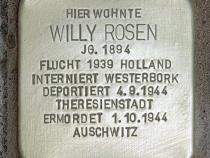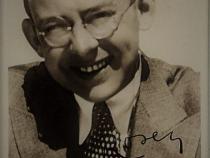Willy Julius Rosen was born in Magdeburg on 18th July 1894 at Breiter Weg 147. His parents were Arthur Rosenbaum (1863 – 1939) and Amalie Mally Rosenbaum geb. Maerker (1872-1942). He had one older sister called Lucie born in 1893 and one younger sister, the opera singer, Edith, born in 1896. Another sibling died shortly after birth.
Rosen attended the “König-Wilhelm-Gymnasium" in Magdeburg. He was then sent by his father as an apprentice at Konfektionsfirma “Kleider en gros”in Berlin. He completed his apprenticeship successfully. Rosen continued to develop his interest in music. He was drafted into the army in 1915 and served in WW1 on the Russian Front. He published his first piece of music in 1915 (Ich möchte so gern Soldaten haben). Like many others he was wounded. Whilst convalescing he played piano and gave performances to other troops. After the war Rosen returned to Berlin and to his old job. The Berlin address and phone books, in 1919 place him at Pankstrasse 4 as a “Schuerzenkonfekt.” (apron manufacturing). By 1929 he had moved to Cicerostrasse 55, in Halensee. The 1932 phone book lists Rosen as a Komponist, rather than working in the clothing industry. This was his Berlin address right up to 1939, the year his father died of natural causes.
In the evenings he played piano at various bars and clubs, such as Die Spinne and Die Rakete. Rosen founded the Rosen Kapelle, a small band. In 1924 he was involved in the founding of "Kabarett der Komiker" by Paul Morgan, Kurt Robitschek and Max Hansen. The first production was "Quo Vadis" for which Rosen wrote the music. It was a new style and parodied not only the film of that name but also Hitler's Putsch of 1923. It ran for over 300 performances. The rave reviews did not endear Rosen to the Nazis. He wrote music for others such as Harry Woldau, Max Hansen, Curt Bois and Paul O'Montis. Will Meisel published some of his music. He rose to be a renowned Cabaret Star and composer of Schlager. A whirlwind of appearances ensued, including his favourite - performances for children. In 1923 he had married Elsbeth Hoffmann.
In 1927, he appeared at the invitation of Buergermeister Hermann Beims, mayor of his home city Magdeburg. It was a great success, performing in the German Theatre Exhibition in his hometown. He won the Goldene Geige im Deutschen Schlagerwettbewerb, twice.
On 15th September 1931 he officially adopted his stage name "Rosen". His birth record shows he was named Willy at birth.
Rosen collaborated with many other lyricists and composers. He completed over 600 compositions and made 75 personal recordings. He appeared in 7 "Spielfilmen" and was involved in a total of 21 films, writing words or music, between 1926 and 1934. His music was sung and played by many famous artists of the 1920's and 1930's.
Today he is virtually unknown even though his songs are still sung by modern performers. Some of his compositions are performed without attribution to him or wrongly attributed by modern media to others. Rosen disappeared from German culture step by step after the 1933 success of the NSDAP and the introduction of Race Laws, for he and his family were Jewish. Rosen first went to the Netherlands with the little “Theater der Prominenten” but opposition from the Dutch Music Unions forced them away. Rosen was still recording clandestinely, in the cellars of a Synagogue, as in 1935 for Lukraphon. His contract with Odeon had been terminated when the owners were forced to sell. He was able to perform in the Jewish Theatre or Kulturbund but nowhere else in Germany.
From the Netherlands he visited various countries including Austria and Switzerland. He applied for residency in Switzerland. Rosen eventually found refuge back in the Netherlands. He put on Revues in Scheveningen, a seaside town, producing these and writing the songs. He was later joined by Max Ehrlich who had stayed on in Berlin. Ehrlich had invited Rosen back to Berlin, on several occasions to perform in Ehrlich's revues. Shows in the Netherlands starred the "Theater der Prominenten", Jewish performers from Germany and Holland, such as Siegfried Arno, Oskar Karlweis and Camilla Spira, in 50 Revues from 1936 to 1941.
The Dutch Revues came to an end in May 1942, a little over a year after the Nazis invaded the Netherlands and Jews were then interned in Westerbork, a Nazi transit and later concentration camp in the north of the country. Rosen had divorced his wife Elsbeth as she was being intimidated by the Gestapo and in 1942 he married Olga Maria Krauskopf (1905-1944). In December 1942 Rosen’s mother died in Theresienstadt.
From 1942 until September in 1944 Rosen along with Erich Ziegler and Max Ehrlich and a multitude of artistic talent put on the "Best Cabaret in Europe". Albert Gemmeker, the SS Lagerkommandant in those years, encouraged these performances, allowing props and costumes to be sourced. Etty Hillesum records in her diary, that Willy Rosen had to perform his songs for the Kommandant to approve. “He sang his heart out for Gemmeker, as his name had been put on the list for transportation”. Nazi officials including Adolf Eichmann would visit and sit on the front row, with the audience that was due to be "sent east" the following day, sitting behind.
Rosen continued to compose whilst in captivity and some of the music from the “Buehne” shows has survived.
There was resentment amongst some in Westerbork camp that revue performers were often exempt from transport, but this was not always true. Many performers went east and disappeared from the programmes. Rosen had been on the list once. It is true that Rosen and Ehrlich were amongst the last to be transported. Ziegler was one of the very few from the “Buehne", not to have been sent east. When lists were read out for transport, those selected cried. Those not selected sang and danced.
Over 40 revues were performed from 1942 to 1944 when the day came that Willy and his wife Olga were transported to Theresienstadt (Czechoslovakia) on the 4th September 1944 as numbers 576 and 577 on Transport xxiv/7. Ten days later the transports from Westerbork ended.
The train meandered through Nazi occupied Europe, even passing through Magdeburg, arriving at Theresienstadt on the 6th September. After a brief "stop over" at this Concentration Camp, Willy and Olga were separated. He went on to Auschwitz Birkenau in Nazi occupied Poland on Transport El on 29th September 1944, with Max Ehrlich. They arrived at Ramp 3, inside Auschwitz Birkenau, in plain view of all the other prisoners. He was gassed with Zyklon B, on the evening of 30th September and October 1st 1944, immediately after arrival with Max Ehrlich. Olga followed him to Auschwitz on Transport En as number 87, dying probably in January or February 1945 on a "Todesmarsch". She was declared dead to the date 15th March 1945.
Why did Willy Rosen not escape? His sisters did! Funds had been raised by Kurt Robitschek in the USA. Visas for Cuba were finalised but, like many others, he left it too late. The unthinkable happened, Germany had invaded the Netherlands and when the USA entered the war visas for Cuba were cancelled. Rosen’s sisters escaped in 1939, Lucie to South America and Edith “Maerker” to England.
Willy Rosen
Location
Cicerostraße 55
District
Halensee
Born
18 July 1894 in Magdeburg
Occupation
Kompanist
Escape
1939 Holland
Interniert
in
Westerbork
Deportation
on 04 September 1944
to
Theresienstadt
Later deported
on 29 September 1944
to
Auschwitz
Murdered
01 October 1944 in Auschwitz




